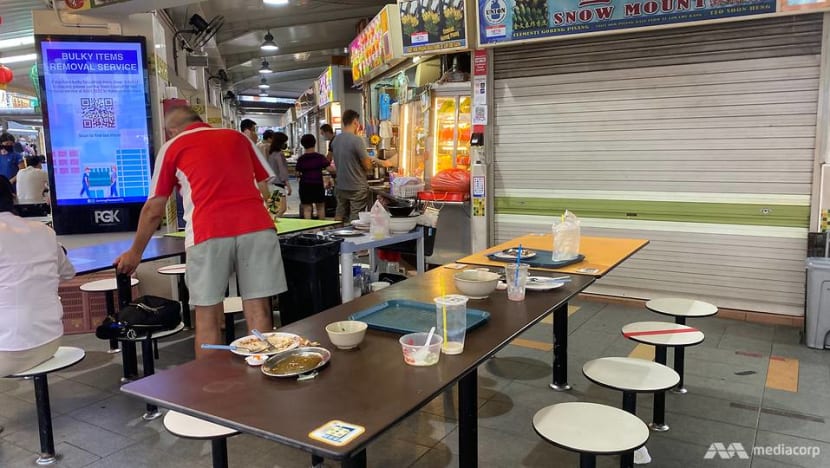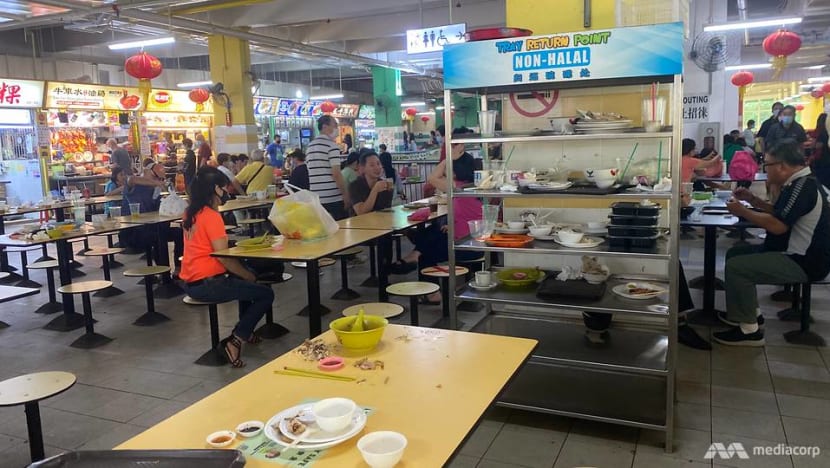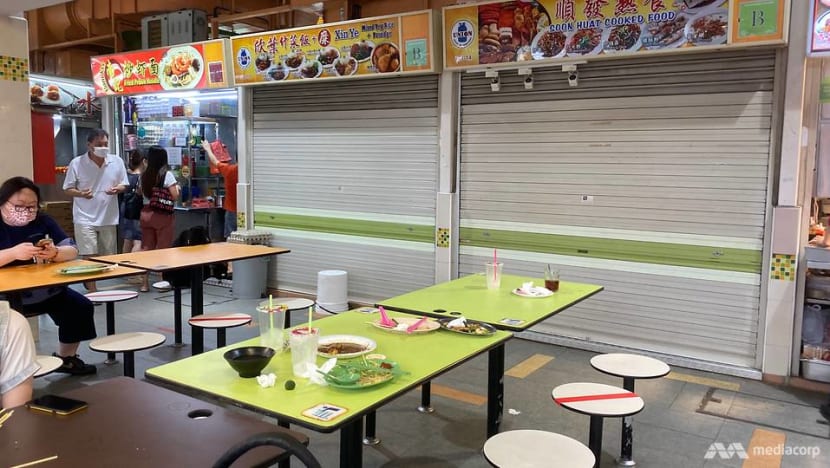Leaving behind trays, food debris at hawker centres could expose others to diseases: Health experts

Trays and used utensils were left behind by diners when CNA visited Clementi Market and Food Centre on Feb 4, 2021. (Photo: Ang Hwee Min)
SINGAPORE: What happens when you leave behind your trays, utensils and food debris at hawker centres instead of returning them to the designated points?
Most people think of the mess left behind and the inconvenience to other diners, but leaving trays and dirty plates out could also breed germs and expose others to potentially fatal diseases, public health experts warned.
A recent episode of Talking Point highlighted the perennial problem of unreturned trays in hawker centres.
Comments under CNA’s Facebook post were mixed - while some suggested it was the cleaners’ jobs to clear the trays, the top two comments called on Singaporeans to return their trays, put their food debris back on the plates and dispose of their used tissues.

Leaving trays and used utensils out and allowing the next person - whether a cleaner or another diner - to touch them could cause the transmission of diseases including salmonella, animal-borne viruses and even COVID-19, said public health researcher Matthew Chua.
These diseases could be “potentially fatal” if left untreated or not treated in time, said Dr Chua. Hospitalisation could result in severe cases.
Public Hygiene Council chairman Edward D’Silva said: “When diners leave their trays, used utensils and tissues behind on the table, it exposes saliva droplets and germs to the next user and our cleaners. Bacteria from unfinished food by the previous diner have the potential to spread freely.”
Singapore’s warm climate, in addition to the “dirty and wet areas” at coffee shops could also accelerate the breeding of harmful microbes, he added.
TRAYS LEFT OUT TOO LONG WILL ATTRACT UNWANTED PESTS
At Chinatown Complex Food Centre, it takes about 20 staff members to clean the tables and return trays, said Mr Cornelius Tan, vice-secretary of the Chinatown Complex Hawkers Merchant Association.
Lunch hours are the busiest, he added.
“There is a tendency (for unreturned trays and used utensils) to attract unwanted pests and birds if left unattended for a long duration,” said Mr Tan, adding that the association has installed nets on the second level of the food centre to keep birds out.
Pest droppings are also an “ominous vector” for virus and disease transmission, said Mr D’Silva of the Public Hygiene Council.
“When we clear our own food trays and return them to the tray return point, we limit the opportunity for pests to congregate near the eating areas and reduce the risk of us contracting these diseases.”
While the Chinatown Complex Hawkers Merchant Association has pasted sticker labels on tables to advise diners to return their trays, dirty plates and trays littered with food and used tissues were still sitting on tables waiting to be cleared when CNA visited at lunchtime on Friday (Feb 5).
Rather than clearing the dirty plates, many diners were seen pushing them to the edge of the table before sitting down with their food.
CLEANERS "ESPECIALLY VULNERABLE"
While not all diners had trays for their food, as CNA observed, those who sat at tables just a few steps away from the tray return point did not return their trays and bowls.
The task of clearing plates and trays left on the tables fell on a few cleaners who moved around the food centre.

CNA observed a similar situation at Clementi Market and Food Centre on Thursday at dinner time.
Some diners were seen holding their food and walking past empty tables that were not cleared, opting to look for ones that have already been cleaned.
There were even some who sat at tables with dirty plates and trays, and waited for the cleaners to clear the table before leaving to buy their food.
Cleaners are “especially vulnerable” to the germs that come with uncleared tables, said Mr D’Silva.
“All it takes is one cleaner to come into contact with unknown pathogens on a dirty plate, for them to catch an unwanted disease – especially so in a pandemic climate.”
Singapore’s army of 59,000 cleaners tend to be the elderly. Many of them will retire in the next 10 to 20 years, with hardly any younger workers to take over from them, he said.
“With the ongoing pandemic, we see more people wiping table tops with sanitary wipes before they order their food. But after finishing their meals, do people pick up after themselves so the next person will also have a clean table?” asked Mr D'Silva.
“We take pride in ensuring that our homes are kept clean, but why do we not spare a thought for the environment and our cleaners when we are out? Cleaning up is everybody’s responsibility and cannot be left to cleaners.”
















